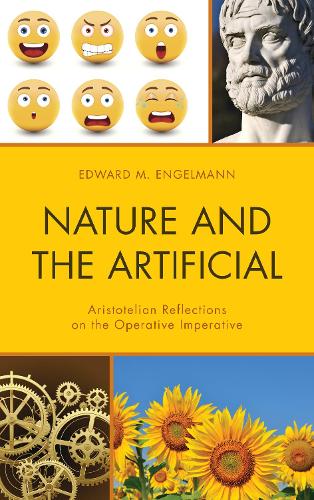
Nature and the Artificial: Aristotelian Reflections on the Operative Imperative
(Hardback)
Publishing Details
Nature and the Artificial: Aristotelian Reflections on the Operative Imperative
By (Author) Edward Engelmann
Bloomsbury Publishing PLC
Lexington Books
21st March 2017
United States
Classifications
Professional and Scholarly
Non Fiction
Philosophical traditions and schools of thought
113
Physical Properties
Hardback
184
Width 159mm, Height 241mm, Spine 18mm
413g
Description
For years now much attention has been given to the phenomenon of the artificial. Speculation regarding what is real abounds in the sciences, literature, as well as films and other visual arts. This work presents the first critical, sustained, philosophical study on this topic. Nature and the Artificial: Aristotelian Reflections on the Operative Imperative reveals the inner logic of the artificial by reflecting it off the metaphysical relationship between nature and techne as conceived by Aristotle and Thomas Aquinas. During early modernity, figures such as Descartes and Bacon transformed this understanding, giving rise to the notion of the operative imperative. Nature and techne, for the Aristotelian tradition and for us, can only be understood in terms of their dialectical relationship to one another. Aristotle articulates this relationship with the phrase techne imitates nature. With the operative imperative, however, a certain reversal takes place, whereby techne becomes the paradigm for nature. As Ed Engelmann demonstrates, the operative imperative, together with the phenomenon of the artificial it implies, stands to Aristotelian metaphysics of nature as image is to original. Anyone who believes that the rise of the artificial in our civilization needs the intensive study it deservesas well as those who are seeking innovative insights into Aristotelian traditionwill want to read this book.
Reviews
In his very wide ranging book Englemann offers a new and original understanding of the transition from the sciences of Aristotle to the beginnings of the new sciences of the 17th century and traces the rise of the artificial as a preferred model for the explanation of nature. The power of the book lies in the details and insights he offers in his close examination of Aristotelianism, early modern science, and the sciences of the artificial. He begins with theories of causation in the middle ages and ends by considering consciousness in machines. A valuable contribution to both philosophy and the history of ideas. -- John Visvader, College of the Atlantic
Ed Engelmann's book Nature and the Artificial: Aristotelian Reflections on the Operative Imperative, is an erudite and challenging look at the roots of today's operative, and ultimately artificial intelligence. It traces the history of the Aristotelian worldview, and shows that our current paradigm it relation to it as image to original. It will provoke a much-needed reassessment of that tradition. -- Frederick Amrine, University of Michigan
Author Bio
Edward M. Engelmann teaches philosophy at Merrimack College and Bridgewater State University.
